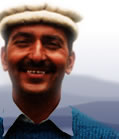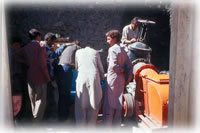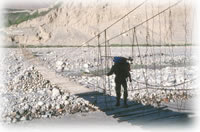 |
 |
||
 |
|||
|
RELATED THEMES education communications social institutions OTHER LOCAL THEMES BACKGROUND |
development
There is pride in the self-sufficiency and independence of the past and the narrators express much nostalgia for the unity and greater "sympathy" of previous times. But people also openly express the "miseries" and poverty of the past and most developments (education, electricity, the road) are viewed positively in terms of the improvements they have made to life in Shimshal. The traditional development system of nomus is discussed in many testimonies. The nomus refers to the system by which people with sufficient resources sponsor a community development project, for example a bridge, in the name of a relative. The sponsorship takes the form of resources for the project and/or food for the community volunteers who carry out the construction. The particular project is always referred to by the name of the person in whose name it was sponsored and by the name of the person who actually sponsored it. In previous times nomus enabled the community to develop its infrastructure of trails, bridges and community buildings. Nomus is acknowledged by some as crucial to the community's survival: "The reason for our successful survival was due to the customs and traditions of philanthropy. Because if they had not built vandan (area where herders take their yaks for milking) and ghell (shelter for goats and sheep) and if they had not built in the name of God the bridges and trails… then who else would have cared about us?... This village was built in the name of God… Right from the construction of channels and huts to the construction of houses and trails, our parents, our forefathers and our ancestors spent tremendous resources to build Shimshal..." (Pakistan 6). In addition to the benefits nomus brings to the community, it is evidently important for individuals and families. Many narrators talk with pride about the various nomus they or their family carried out in memory of certain relatives. The "self-help" principles of nomus are still very much alive in Shimshal; there appears to be a continuing willingness to contribute to community development. In recent years the community-based organisation the Shimshal Nature Trust (SNT) has attempted to nurture this tradition of self-reliance for current development needs. The Aga Khan Rural Support Programme (AKRSP) played a key role in recent years in terms of Shimshal's development. Most importantly it is largely responsible for supporting the construction of the road to Shimshal: "…we formed three village organisations…and we got funding from AKRSP for our major project of the Shimshal link road, which was a very difficult and risky project. AKRSP guided us and provided us with the financial and technical assistance and we constructed the road…" (Pakistan 13). The AKRSP has also supported other development activities within Shimshal, including afforestation and veterinary care, through the local institutions it set up: the Village Organisations and Women's Organisations. Other development agencies which have been involved in Shimshal in recent times include the Aga Khan Health Service (AKHS), the Aga Khan Education Service (AKES) and the International Union of the Conservation of Nature (IUCN). Whilst grateful for the support of these organisations, the SNT is keen for Shimshalis to gain more control of the development process within Shimshal. Towards this aim the SNT produced its own 15-year management plan and is striving to work in partnership with external organisations of their choice, in order to have a greater say in development activities taking place in Shimshal. quotes about development"…We can't stop development, it's important to be modern, it's important to get all the modern facilities. But you know we should not forget the real values, the things which have been given to us, which are the key to our happiness, spending a life in this hard and harsh nature."
"Modernisation doesn't mean that your culture ceases to have importance, it means carrying your culture with you while development [takes place], and adapting your culture." "It is almost a lifetime assignment for an individual [to perform nomus]… People offer their wealth, their knowledge, profession, expertise and physical strength to the community… the source of inspiration was the reward and recognition from the community… for example those who were physically strong, they were praised in their songs… One who would donate part of their wealth to the community… people would appreciate it and would look after or guard his property… if one person would possess more yaks, people would look after them because they would know that some of these (yaks) would come to the community in nomus." "AKRSP revolutionised development not only in Shimshal, but in the entire northern areas. It brought communities closer and developed brotherhood among them. It also helped the people through saving and pooling their resources and utilising them for their community development. It caused financial development and mental development of the people. It changed the perception of the people." "…in former times, people had done a lot of charity works through nomus and it continues until today. When AKRSP (the Aga Khan Rural Support Programme) undertook the construction work of the jeep road to Shimshal many generous people offered their wealth as nomus for this noble work." "…we were in desperate need of a road link to our village… It was the major problem of the community and the government of Pakistan had surveyed this project several times and declared it unfeasible. People knew that prosperity could only come with the road link… Therefore people started constructing the road with the money AKRSP had donated… People worked on a self-help basis and the necessary assistance like the cost of explosives, diesel and food stuff was covered by AKRSP. People provided free labour and set an example to the government… the government [then] felt it as a matter of prestige and therefore… started construction. Thanks to AKRSP… without their support, the construction work of the road would have never started." "At Qoroon Ben, your grandfather had built a bridge for the people to cross the river, and he never let it die, but he always used his wealth to rebuild that bridge, it has been swept away by the river many times and he constructed that many times." "That is how people have been living for hundreds of years; self-sufficiency… The notion, you know, that you should demand from your government to do things for you and you should not do anything yourself, that is a bad culture from the south… what SNT is striving for is the revival of, or to give value to the practice of self-reliance… That is a more honourable way of doing it. That is the SNT's approach." "We have many talented young climbers. To develop and furnish their skills we need a well equipped mountaineering school which is part of our future plan. Shimshal has a rich culture which it is important to preserve in a proper manner. For that the cultural committee should be made active… We have to renovate our museum and Farman Khana (place where religious ceremonies were celebrated when there was no Jamat Khana). The women's organisation has to be made active so that the women should not feel behind from the men in the development works in the village." |
|
 The pace of economic and social change in Shimshal has increased considerably in recent decades. The end of the Mir's regime in 1974, followed by the completion of the Karakoram Highway (KKH) in the early 1980s, were key events in the region. The construction of the link road to Shimshal from the KKH has been underway for several decades and has shaped people's expectations of development. Its completion in September 2003 will have made some of those expectations a reality.
The pace of economic and social change in Shimshal has increased considerably in recent decades. The end of the Mir's regime in 1974, followed by the completion of the Karakoram Highway (KKH) in the early 1980s, were key events in the region. The construction of the link road to Shimshal from the KKH has been underway for several decades and has shaped people's expectations of development. Its completion in September 2003 will have made some of those expectations a reality. The Mir, quite literally, limited the development of Hunza and Gojal by prohibiting people from Hunza and Gojal to travel outside the area. A few individuals managed to escape or obtain permission to leave; Daulat Amin was educated in Gilgit and then returned to Shimshal to become the first formal teacher. Within one generation not only was formal education initiated in Shimshal but it has now become almost universal. Education and the road are recognised as being significant for Shimshal's development and are discussed by many narrators. Hussn, a female teacher, believes,
The Mir, quite literally, limited the development of Hunza and Gojal by prohibiting people from Hunza and Gojal to travel outside the area. A few individuals managed to escape or obtain permission to leave; Daulat Amin was educated in Gilgit and then returned to Shimshal to become the first formal teacher. Within one generation not only was formal education initiated in Shimshal but it has now become almost universal. Education and the road are recognised as being significant for Shimshal's development and are discussed by many narrators. Hussn, a female teacher, believes,